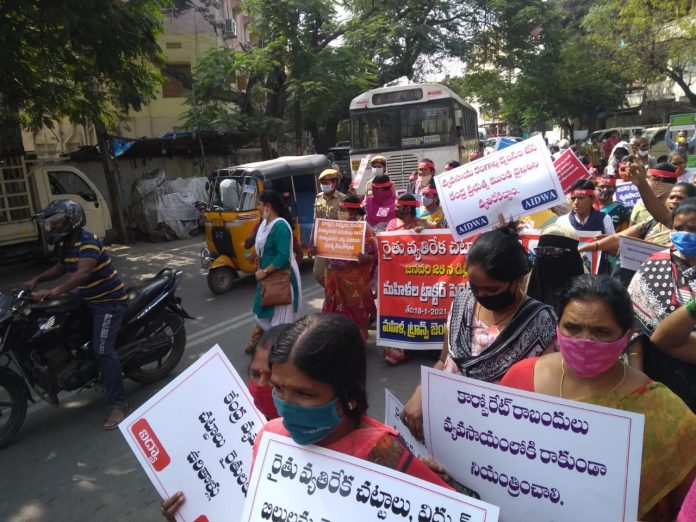Nikhat Fatima siyasat.net
On 18th January 2021, hundreds of women came out to the call of the Samyukta Kisan Morcha and marked the day as the day of women farmers calling it ‘Mahila Kisan diwas’.
The women gathered at Sundariah Vignan Kendra at Baghlingampally and took out a rally till the RTC cross Roads.
The women carried placards condemning the government for passing the three draconian farm laws and demanding the laws be repealed with immediate effect.
The group even stopped at a point and performed a street play depicting the plight of the Indian farmer and how adversely the laws would affect them.
In the group were also women farmers of Telangana state who extended their support and solidarity to the struggle of the farmers at the Singhu borders in the harsh winter.
The women shared that this is their struggle too as the farm laws that have been passed last month would impact their lives in a negative manner unlike the way it is being portrayed by the pro-farm laws people.
They claimed that this is a struggle to protect their lands and ensure food and nutritional security for all. And most importantly women farmers are not recognised at all even though they constitute a substantial part of workforce in India’s farming sector.
Despite their critical role in agriculture and allied sectors women have largely remained invisible as farmers to the government in terms of agricultural policies, schemes, programmes and budgets as well as formal support systems such as credit, extension, insurance and marketing services. Invisibility of women as farmers has also meant that the drudgery of their work is not visible enough for any serious research into developing gender friendly tools and equipment in agriculture.
While issues of recognition and voice are important, gender and social justice cannot be achieved within the current mainstream paradigm which devalues women’s work and knowledge and denies them the status of a farmer. Increased mechanisation has displaced women’s labour, increased use of chemicals, pesticides, high yielding and hybrid varieties of seed have devalued women’s knowledge of resources and their sustainable use while also reducing their opportunities for employment.
Even access to land and other resources is not easy for women despite their strong presence in the agriculture sector. Ownership of agricultural land is also very less as compared to that of men. The average land holding for women is 0.9 ha whereas for men it is 1.10 ha. Women’s poor asset ownership has important implications for access to agricultural inputs like water, seeds, credit, extension, technologies, insurance etc as well as on their opportunities for human development & freedom from violence.
The three farm laws viz., The Farmers’ Produce Trade and Commerce (Promotion and Facilitation) Act, The Farmers (Empowerment and Protection) Agreement of Price Assurance and Farm Services Act, and The Essential Commodities (Amendment) Act will have an adverse effect on the women farmers adding to their already existing challenges such as lack of recognition as farmers, unequal rights over key resources such as land, water, forests and other sources, gendered access to support systems and services related to agricultural credit, inputs, subsidies, budgets and marketing their produce.
The 3 latest legislations will further subject them to a new set of vulnerabilities and livelihood threats.
The women farmers have the following demand from both the state and Central government:
-
Women farmers demand the repeal of the three draconian farm laws with immediate effect!
-
Women farmers want a legal guarantee to remunerative prices!
-
Women Farmers demand recognition as Farmers in their own right !
-
Women farmers demand secure and independent rights over key resources such as land, forests, water and Commons
-
Women farmers demand budgetary allocations that are proportionate to their role, participation and contribution in agriculture
-
Women farmers demand schemes, subsidies, credit support services & technologies that are responsive to their needs and concerns and de linked from land ownership
-
Registration of women as Farmers, in a unified registry, cutting across departments and ministries – ENSURE WOMEN FARMERS HAVE AN IDENTITY AS FARMERS
-
Reforms in the APMCs that would ensure easy access to women farmers who trade at the local level. This could be on the lines of the initiatives taken by the government of Andhra Pradesh and Telangana to hand over procurement to women’s SHGs at the village level and also support direct marketing initiatives.
-
Reforms for (a) incentivising decentralised procurement including procurement of coarse grains; (b) geographical diversification of procurement operations; (c) augmentation of adequate decentralised modern and scientific storage; (d) giving top priority to the movement of food grains and providing sufficient number of rakes for this purpose, including expanding the line capacity of railways to facilitate food grain movement from surplus to consuming regions
-
Create an enabling environment that promotes women’s FPOs by giving them higher equity grant and working capital at low interests; encourages it in procurement at the local level. This could be done by introducing a reasonable target of all women FPOs in the recently introduced operational guidelines of FPOs (July 2020). The government should also remove FPOs from the purview of the Acts brought in.
-
Universalize and expand PDS to include millets, pulses and oil that could be procured through decentralized procurement systems by guaranteeing remunerative prices. It would address the concerns of the procurement of farm produce as well as fulfill the goal of eliminating hunger.
(www.siyasat.net is Ahmedabad, Gujarat, India based website, powered by Gujarat siyasat)
An Appeal For The Sake Of Upright & Fearless Brand Of Journalism































